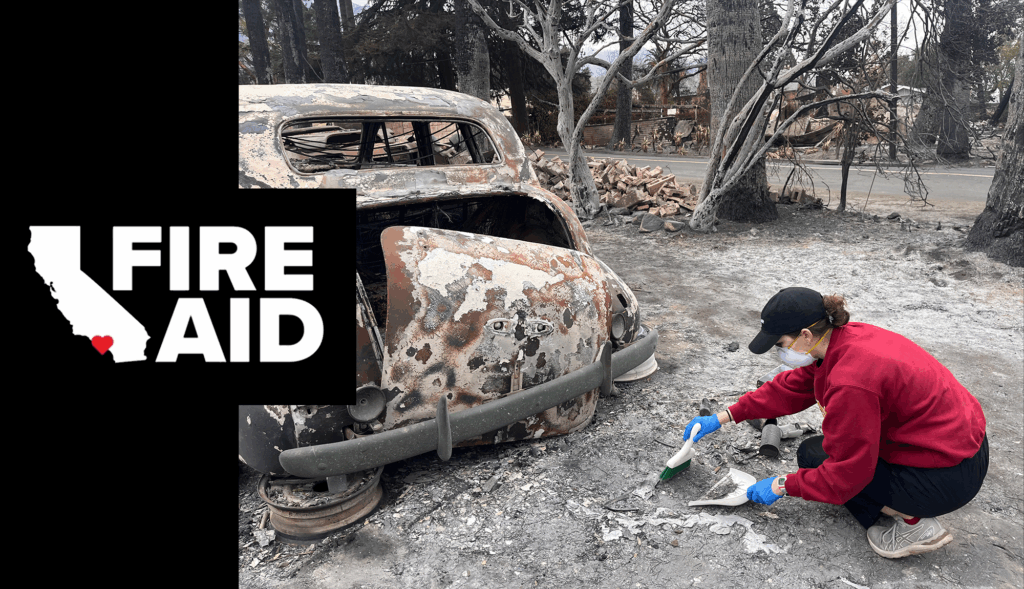By Michael Liu Rod Yabut
As cleanup continues in neighborhoods hit by the January Los Angeles wildfires, a $1 million gift from FireAid — the nonprofit that organized a post-fire benefit concert — will help expand testing for toxic soil contamination in hard-hit communities.
The funding supports Contaminant Level Evaluation and Analysis for Neighborhoods, or CLEAN, a project led by researchers in Earth Sciences at USC Dornsife’s College of Letters, Arts and Sciences. The initiative is a collaboration with Public Exchange (PX) at USC Dornsife and the Keck School of Medicine of USC. The researchers have been testing for lead in soil at homes, schools and playgrounds in L.A.’s Pacific Palisades and Altadena neighborhoods since March.
With the new support from FireAid, USC researchers will broaden their scope beyond just lead to screen for other contaminants that pose a risk to human health, including heavy metals and polycyclic aromatic hydrocarbons (PAHs).
“We’re thrilled that we can scale up our work and test for a broader set of contaminants beyond lead,” said Josh West, professor of Earth sciences and environmental studies at USC Dornsife and project co-lead. “This money will also speed up lab processing to help residents make faster, better-informed decisions about health risks as they recover and rebuild their lives.”
Faster results, wider reach for soil testing
The January wildfires scorched nearly 40,000 acres and destroyed more than 16,000 structures across Pacific Palisades and Altadena. In the weeks after the fire was contained, the researchers themselves began collecting soil samples from the burned residential areas. Then CLEAN launched a few weeks later, opening its doors to community submissions, and the team has since analyzed more than 1,500 samples for lead levels, with another 2,000 awaiting processing.
This new grant will help accelerate the effort, said Seth John, associate professor of Earth sciences at USC Dornsife and project co-lead.
“In the Eaton fire region, residents we met often asked for help testing soils in their own yards and gardens,” John said. “This funding makes that possible.”
Public Exchange works to solve real-world problems
CLEAN was created to address a key gap in environmental testing after the wildfires. As part of PX’s mission to connect university research with real-world needs, the initiative launched as news surfaced that federal agencies declined to test soil once debris and topsoil were removed — and when formal environmental testing proved too costly for many residents.
CLEAN offers free testing to all Los Angeles County residents. Samples can be dropped off at locations across the area, including in Pacific Palisades, Santa Monica, Marina Del Rey, Pasadena, Altadena and Boyle Heights. Or they can be mailed to USC scientists.
In addition to sample testing, a portion of the new funding will go towards expanding collection sites, hosting community events and ramping up an awareness campaign, explained Sujeet Rao, director of the Health and Wellbeing Practice at Public Exchange.
“Our team’s efforts are not complete without robust public communication about what results mean for residents and their families. This new funding will help ensure that the findings and guidance from our USC researchers reach the people who need it most,” Rao said.
The researchers and PX team say they’re also laying the groundwork for a long-term model — one that shows how authorities can respond more directly to environmental crises.
“This is just the beginning,” said project co-lead Sam Silva, assistant professor of Earth sciences, civil and environmental engineering, and population and public health sciences. “We’re proud of what we’ve accomplished and we’re ready to do more so our work has a lasting impact in our communities.”
About CLEAN
The CLEAN initiative is distinct from soil testing efforts led by other research teams and government agencies such as the Los Angeles County Department of Public Health. While CLEAN’s testing is rigorous and reliable, it is not meant to replace the comprehensive environmental evaluations required in some situations. Instead, the CLEAN team’s goal is to provide a fast, science-backed overview of potential health risks, empowering residents as they navigate their paths to recovery.
About FireAid
FireAid was founded in the aftermath of the wildfires and held a global benefit concert that raised an estimated $100 million. Its first round of grants — totaling $50 million — funded emergency aid for more than 150,000 residents through over 120 nonprofit organizations. The CLEAN grant is part of FireAid’s second-phase investment in long-term recovery and environmental remediation.
